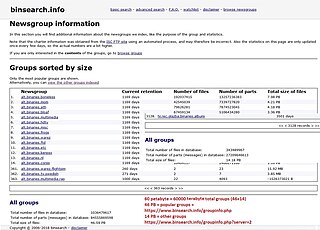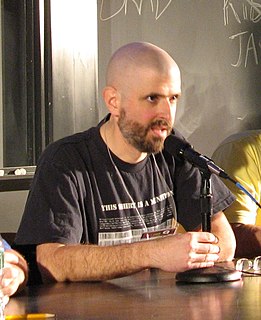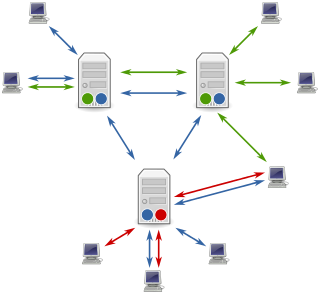Related Research Articles
The backbone cabal was an informal organization of large-site news server administrators of the worldwide distributed newsgroup-based discussion system Usenet. It existed from about 1983 at least into the 2000s.
A frequently asked questions (FAQ) forum is often used in articles, websites, email lists, and online forums where common questions tend to recur, for example through posts or queries by new users related to common knowledge gaps. The purpose of an FAQ is generally to provide information on frequent questions or concerns; however, the format is a useful means of organizing information, and text consisting of questions and their answers may thus be called an FAQ regardless of whether the questions are actually frequently asked.

James Parry, commonly known by his nickname and username Kibo, is a Usenetter known for his sense of humor, various surrealist net pranks, an absurdly long .signature, and a machine-assisted knack for "kibozing": joining any thread in which "kibo" was mentioned. His exploits have earned him a multitude of enthusiasts, who celebrate him as the head deity of the parody religion "Kibology", centered on the humor newsgroup alt.religion.kibology.
A Usenet newsgroup is a repository usually within the Usenet system, for messages posted from many users in different locations using Internet. They are discussion groups and are not devoted to publishing news. Newsgroups are technically distinct from, but functionally similar to, discussion forums on the World Wide Web. Newsreader software is used to read the content of newsgroups.
The newsgroup alt.religion.scientology is a Usenet newsgroup started in 1991 to discuss the controversial beliefs of Scientology, as well as the activities of the Church of Scientology, which claims exclusive intellectual property rights thereto and is viewed by many as a dangerous cult. The newsgroup has become the focal point of an aggressive battle known as Scientology versus the Internet, which has taken place both online and in the courts.
Serdar Argic was the alias used in one of the first automated newsgroup spam incidents on Usenet, with the objective of denying the Armenian Genocide.
A news server is a collection of software used to handle Usenet articles. It may also refer to a computer itself which is primarily or solely used for handling Usenet. Access to Usenet is only available through news server provider.

The alt.* hierarchy is a major class of newsgroups in Usenet, containing all newsgroups whose name begins with "alt.", organized hierarchically. The alt.* hierarchy is not confined to newsgroups of any specific subject or type, although in practice more formally organized groups tend not to occur in alt.*. The alt.* hierarchy was created by John Gilmore and Brian Reid.
Sporgery is the disruptive act of posting a flood of articles to a Usenet newsgroup, with the article headers falsified so that they appear to have been posted by others. The word is a portmanteau of spam and forgery, coined by German software developer, and critic of Scientology, Tilman Hausherr.
X-No-Archive, also known colloquially as xna, is a newsgroup message header field used to prevent a Usenet message from being archived in various servers.
A discussion group is a group of individuals, typically who share a similar interest, who gather either formally or informally to discuss ideas, solve problems, or make comments. Common methods of conversing including meeting in person, conducting conference calls, using text messaging, or using a website such as an Internet forum. People respond, add comments, and make posts on such forums, as well as on established mailing lists, in news groups, or in IRC channels. Other group members could choose to respond by posting text or image.
alt.sex is a Usenet newsgroup – a discussion group within the Usenet network – relating to human sexual activity. It was popular in the 1990s. An October 1993 survey by Brian Reid reported an estimated worldwide readership for the alt.sex newsgroup of 3.3 million, that being 8% of the total Usenet readership, with 67% of all Usenet "nodes" carrying the group. At that time, alt.sex had an estimated traffic of 2,300 messages per month.
Newsgroup spam is a type of spam where the targets are Usenet newsgroups.
On Usenet, the Usenet Death Penalty (UDP) is a final penalty that may be issued against Internet service providers or single users who produce too much spam or fail to adhere to Usenet standards. It is named after the Death-penalty, as it causes the banned user or provider to be unable to use Usenet, essentially killing their service. Messages that fall under the jurisdiction of a Usenet Death Penalty will be cancelled. Cancelled messages are deleted from Usenet servers and not allowed to propagate. This causes users on the affected ISP to be unable to post to Usenet, and it puts pressure on the ISP to change their policies. Notable cases include actions taken against UUNET, CompuServe, and Excite@Home.
The Breidbart Index, developed by Seth Breidbart, is the most significant cancel index in Usenet.

A newsreader is an application program that reads articles on Usenet distributed throughout newsgroups. Newsreaders act as clients which connect to a news server, via the Network News Transfer Protocol (NNTP), to download articles and post new articles. In addition to text-based articles, Usenet is also used to distribute binary files, generally in dedicated "binaries" newsgroups.

Joel K. "Jay" Furr is a writer and software trainer notable as a Usenet personality in the early and mid-1990s.
Control messages are a special kind of Usenet post that are used to control news servers. They differ from ordinary posts by a header field named Control. The body of the field contains control name and arguments.

Usenet is a worldwide distributed discussion system available on computers. It was developed from the general-purpose Unix-to-Unix Copy (UUCP) dial-up network architecture. Tom Truscott and Jim Ellis conceived the idea in 1979, and it was established in 1980. Users read and post messages to one or more categories, known as newsgroups. Usenet resembles a bulletin board system (BBS) in many respects and is the precursor to Internet forums that became widely used. Discussions are threaded, as with web forums and BBSs, though posts are stored on the server sequentially.
The Meow Wars were an early example of a flame war sent over Usenet which began in 1996 and ended circa 1998. Its participants were known as "Meowers". The war was characterized by posters from one newsgroup "crapflooding", or posting a large volume of nonsense messages, to swamp on-topic communication in other groups. Ultimately, the flame war affected many boards, with Roisin Kiberd wrote in Motherboard, a division of Vice, that Internet vocabulary was created as a result of the Meow Wars.
References
- ↑ ARMM
- ↑ Michael D. Maxfield (31 March 1993). "Re: ARMM: ARMM: >>>>Ad Infinitum". Newsgroup: news.admin.policy. Usenet: tweekC4qM0A.H3q@netcom.com.